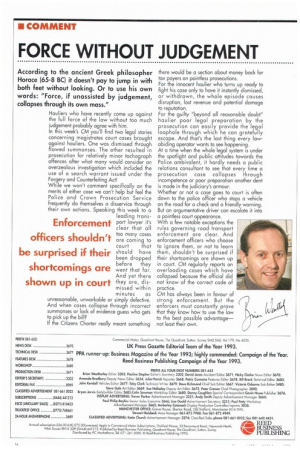FORCE WITHOUT JUDGEMENT
Page 16

If you've noticed an error in this article please click here to report it so we can fix it.
According to the ancient Greek philosopher Horace (65-8 BC) it doesn't pay to jump in with both feet without looking. Or to use his own words: "Force, if unassisted by judgement, collapses through its own mass."
Hauliers who have recently come up against the full force of the law without too much judgement probably agree with him. In this week's CM you'll find two legal stories concerning magistrates court cases brought against hauliers. One was dismissed through flawed summonses. The other resulted in prosecution for relatively minor tachograph offences after what many would consider an overzealous investigation which included the use of a search warrant issued under the Forgery and Counterfeiting Act! While we won't comment specifically on the merits of either case we can't help but feel the Police and Crown Prosecution Service frequently do themselves a disservice through their own actions. Speaking this week to a leading transport lawyer it's clear that all too many cases are coming to court that should have been dropped before they went that far. And yet there they are, dismissed within minutes as unreasonable, unworkable or simply defective. And when cases collapse through incorrect summonses or lack of evidence guess who gets to pick up the bill? If the Citizens Charter really meant something there would be a section about money back for tax payers on pointless prosecutions. For the innocent haulier who turns up, ready to fight his case only to have it instantly dismissed, or withdrawn, the whole episode causes disruption, lost revenue and potential damage to reputation. For the guilty "beyond all reasonable doubt" haulier poor legal preparation by the prosecution can easily provide the legal loophole through which he can gratefully escape. And that's the last thing every lawabiding operator wants to see happening. At a time when the whole legal system is under the spotlight and public attitudes towards the Police ambivalent, it hardly needs a public relations consultant to see that every time a prosecution case collapses through incompetence or poor preparation another dent is made in the judiciary's armour. Whether or not a case goes to court is often down to the police officer who stops a vehicle on the road for a check and a friendly warning. But an argumentative driver can escalate it into a pointless court appearance. With a few notable exceptions the rules governing road transport enforcement are clear. And enforcement officers who choose to ignore them, or not to learn them, shouldn't be surprised if their shortcomings are shown up in court. CM regularly reports on overloading cases which have collapsed because the official did not know of the correct code of practice. CM has always been in favour of strong enforcement. But the enforcers must constantly prove that they know how to use the law to the best possible advantage— not least their own.








































































